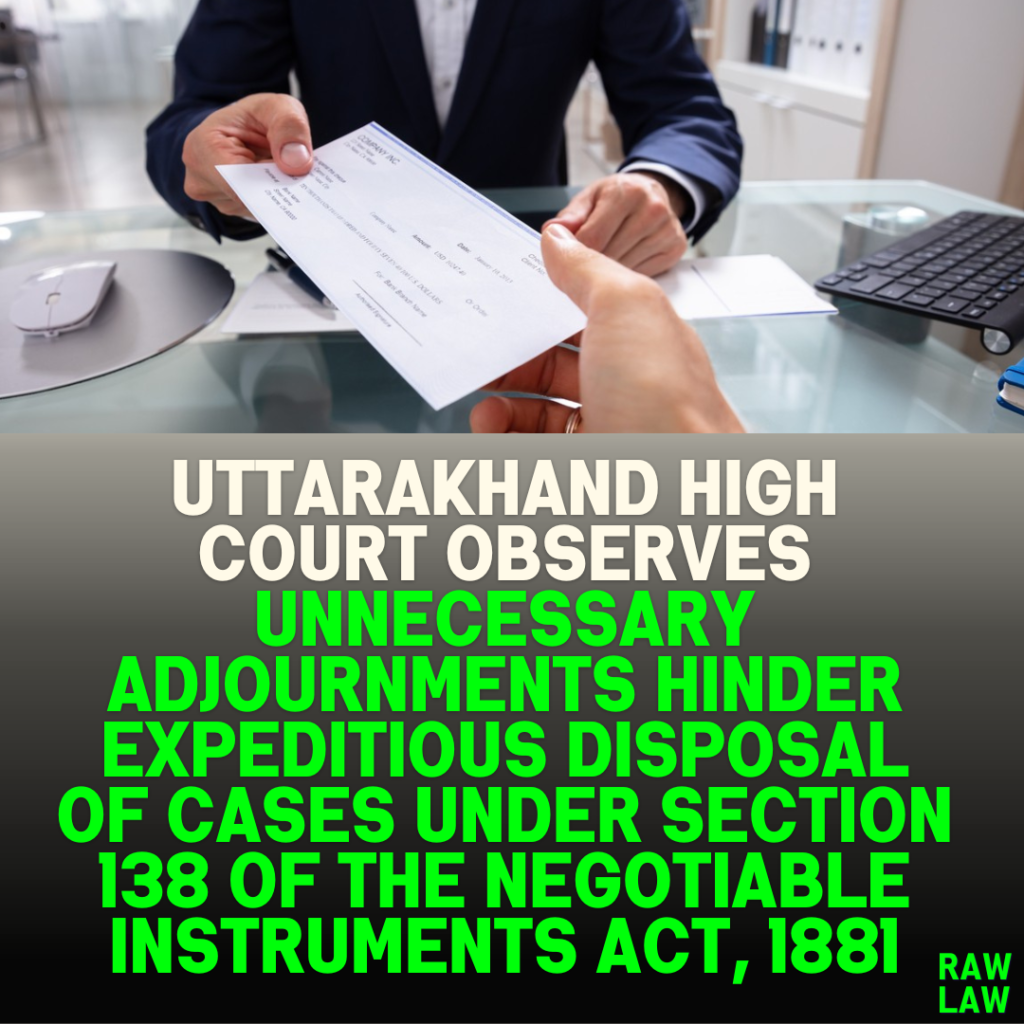Court’s Decision:
The Uttarakhand High Court disposed of the petition seeking expeditious disposal of a complaint case under Section 138 of the Negotiable Instruments Act, 1881, which was pending before the Judicial Magistrate I, Haldwani. The court emphasized that while Section 143(3) of the Act mandates trials to be conducted as expeditiously as possible, completing them within six months is not always feasible due to the type, age, and pendency of cases.
Facts:
The petitioner is the accused in Complaint Case No. 505 of 2022, initiated under Section 138 of the Negotiable Instruments Act. The respondent is the complainant in the case, and the matter has been pending since 2022. The petitioner alleged that the complainant has been avoiding cross-examination for the last year, thereby delaying the proceedings unnecessarily.
Issues:
- Whether the High Court should direct the lower court for expeditious disposal of a complaint case under Section 138 of the Negotiable Instruments Act, 1881.
- Whether the conduct of the complainant in delaying the cross-examination constitutes an abuse of the judicial process.
Petitioner’s Arguments:
The petitioner argued that the case has been unduly prolonged as the complainant has failed to appear for cross-examination for a year. This prolonged absence has led to unnecessary adjournments, contrary to the mandate of Section 143(3) of the Negotiable Instruments Act, which emphasizes expeditious trial.
Respondent’s Arguments:
The respondent’s counsel did not present counter-arguments regarding the delay or offer any justification for the complainant’s absence from cross-examination.
Analysis of the Law:
The primary provision under consideration was Section 143(3) of the Negotiable Instruments Act, which mandates that trials under this section should be conducted expeditiously, with an endeavor to conclude them within six months. However, the court recognized that not all cases could be concluded within this timeframe due to various factors such as complexity, case load, and the pendency of matters in different courts.
Precedent Analysis:
The court referred to the legislative intent behind Section 143(3) to highlight that while a six-month period is ideal for such trials, practical considerations must be accounted for. No specific precedents were cited.
Court’s Reasoning:
The court acknowledged that the complainant’s repeated non-appearance for cross-examination has contributed to the delay. It emphasized the importance of adhering to the legislative mandate of expeditious disposal but also acknowledged the practical constraints faced by trial courts in achieving this goal. The court observed that unnecessary adjournments are to be discouraged and directed the trial court to dispose of the matter as soon as possible, considering the overall pendency and nature of the case.
Conclusion:
The petition was disposed of with an observation that the trial court should make every effort to conclude the matter at the earliest possible opportunity, discouraging any further unwarranted adjournments. However, the court refrained from setting a strict timeline for disposal, taking into account the practical difficulties faced by lower courts.
Implications:
The decision underscores the need for stricter compliance with Section 143(3) of the Negotiable Instruments Act, 1881, but also recognizes the practical constraints in expeditious disposal. This judgment serves as a reminder to both litigants and courts to avoid unnecessary adjournments and ensure that trials under Section 138 are conducted efficiently.



